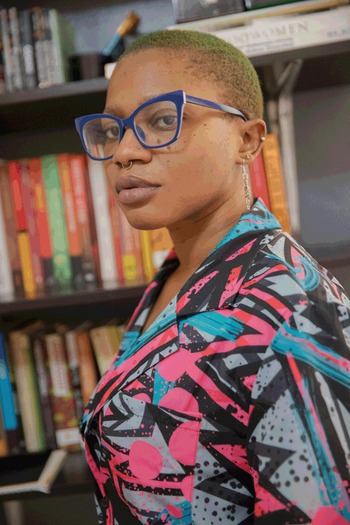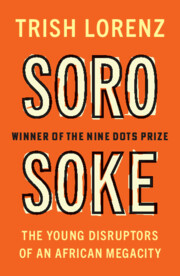‘Really bad things can happen simply because I’m a lesbian. People sometimes say “14 years” to me, to remind me that I am a criminal.’

Figure 20 Uyaiedu Ikpe-Etim, 32, is a film director and screenwriter who creates works that tell the stories of Nigeria’s marginalised LGBTQ+ communities
***
‘Writing a film like Ìfé was seen as such a rebellious thing to do that people now see me as an activist but I actually feel that my whole life is a kind of activism. It’s difficult being a lesbian in Nigeria but on most days that’s not my only identity. It’s the intersection of my identities that I have to navigate, because the majority of my identities are discriminated against. I am a woman, I am unmarried, I’m creative, I have tattoos and dreads and I’m a lesbian.
Really bad things can happen simply because I’m a lesbian. People sometimes say “14 years” to me, to remind me that I am a criminal. I just want to live a normal life. I want to love, I want to go out, hold hands, kiss, take pictures of my girlfriend and I together. But I don’t have that. I sometimes say to my girlfriend “I want to love you in another country; I want our lives and our stories to be normal.”
I don’t have strong hope for the country. I’m pessimistic about Nigeria’s future. There is a misogynistic, patriarchal culture and deeply ingrained homophobia. It’s not just a problem with leadership. We, the people, are also problematic and oppressive. The average Nigerian has a very disturbing way to think about women and queer people. I’m conscious of the privilege I have, that I can go to places that are cosmopolitan and safe. This is not the story of the average lesbian in Nigeria. They don’t have the means. Those kinds of places are expensive, and most people can’t afford to visit them and there are a lot of places that are not safe for queer people.
In future, I hope to tell more queer stories, stories peppered and salted with queer characters. I want to get married and have a baby. I don’t know if I can do that here. The thing is, I am so in touch with my Nigerian-ness and I want to raise my children to be in touch with theirs too. I don’t want to have to raise them in the West just because it is illegal here. It reminds me of those lines from the Ijeoma Umebinyuo poem: too foreign for home / too foreign for here. / never enough for both.’


